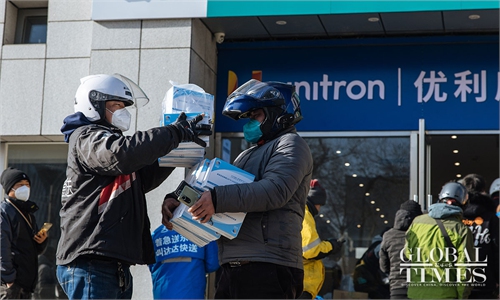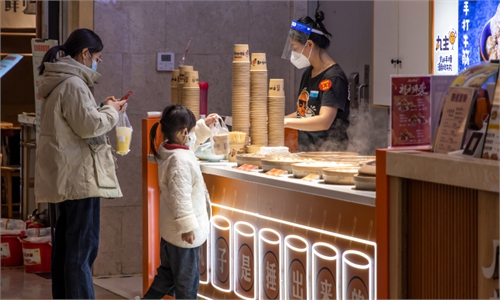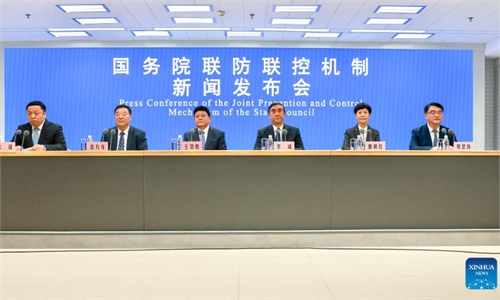China’s devt rate to continue rebound with optimized COVID response, Premier Li tells global economic leaders
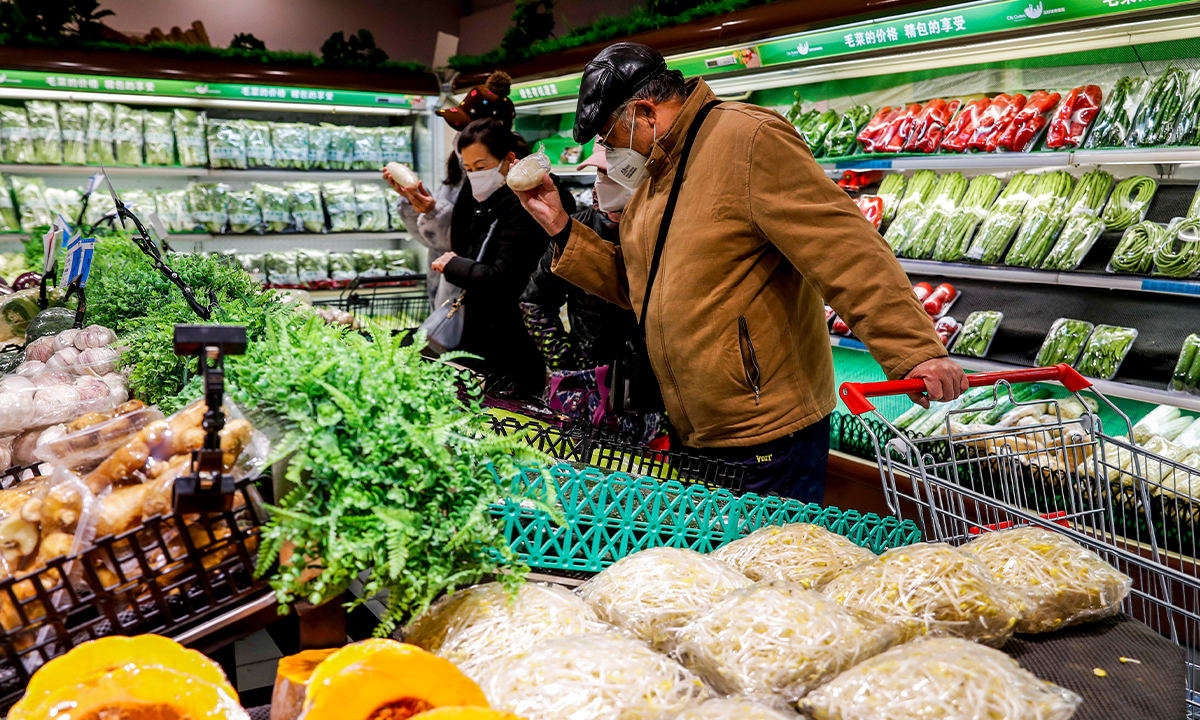
Photo: VCG
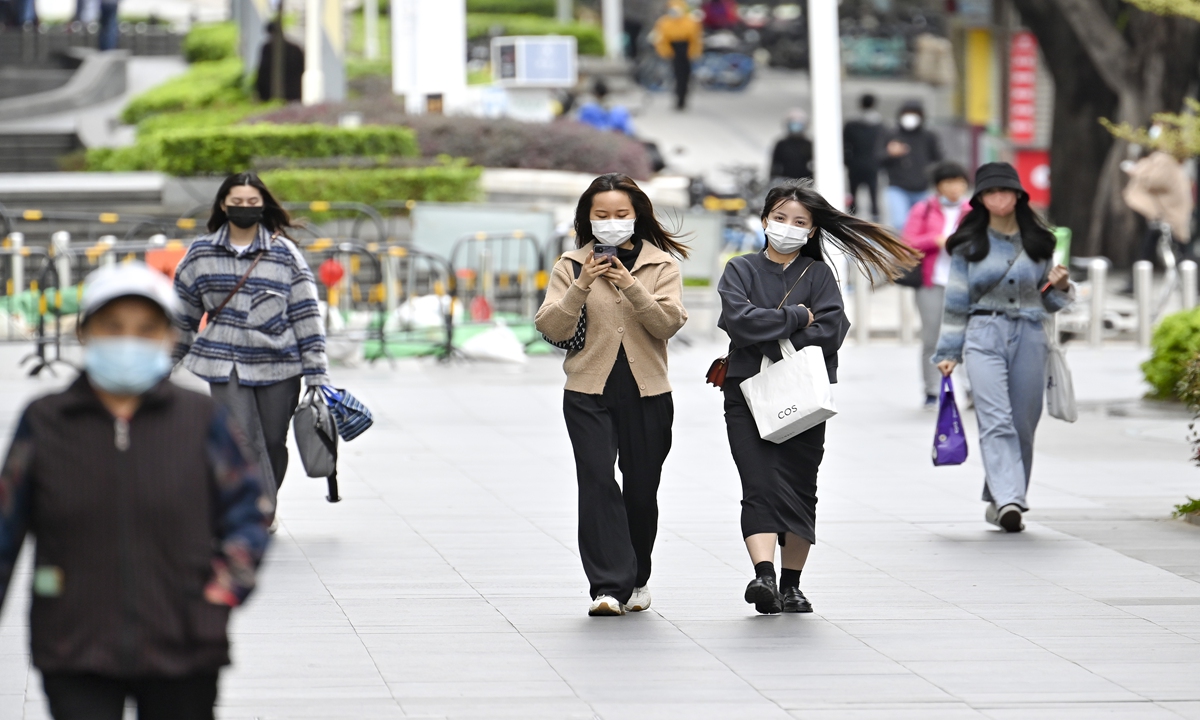
Residents wearing face masks on a street in Guangzhou in South China’s Guangdong Province on Thursday. Several districts in Guangzhou have lifted temporary restrictions. Photo: VCG
China's economic growth will see a continued rebound along with the optimization of coronavirus prevention and control measures, Premier Li Keqiang said on Thursday.Vowing a continued push for high-level opening-up, the premier voiced staunch support for multilateralism and called for joint efforts to address challenges confronting the world economy, according to Chinese state broadcaster CCTV.
Li made the remarks during meetings with the heads of the World Bank, IMF and WTO, as part of the annual "1+6" Roundtable, which returned to the in-person mode this year.
The roundtable meeting puts the spotlight on China's unwavering stance on reform and opening-up, clearly signaling to the global community that China takes delight in building an open and inclusive economy that provides its global partners with growth opportunities, experts said.
That sets China conspicuously apart from the US, which has moved further to pursue its own interests at the expense of others, even its long-term allies, they stressed.
Li met with World Bank President David Malpass, IMF Managing Director Kristalina Georgieva and WTO Director-General Ngozi Okonjo-Iweala, who came to attend the seventh "1+6" Roundtable in Huangshan, East China's Anhui Province.
China is the world's largest developing country while the World Bank is the largest multilateral development institution. China stands ready to deepen cooperation with the World Bank and jointly deal with complexities facing the global economy, the premier said while meeting Malpass.
China is committed to creating a market-oriented, law-abiding and internationalized business environment, Li said, noting that businesses from across the globe are welcome to invest in and partner with China.
The country has achieved steady employment and price levels, stabilized its macroeconomic fundamentals, and kept its economic operation within a reasonable range, a fairly difficult feat considering the impact of the epidemic, the premier continued.
In line with the virus' developments, the country has announced 10 measures to further improve the implementation of its COVID-19 response. Along with the implementation of the optimized measures, China's economic growth is slated for a continued rebound, he said, vowing to better coordinate efforts to contain the virus with economic and social development.
The country's recently announced optimization efforts are seen as good news for the economy, Ye Yu, assistant director of the Institute for World Economy Studies at Shanghai Institutes for International Studies, told the Global Times on Thursday.
This, in addition to China's achievements in taming inflation, cements the belief that China will be a stabilizing force in the world economy, which is currently being haunted by sustained inflation as developed economies largely opt to raise interest rates and tighten their monetary policy, Ye said.
During his meeting with Georgieva, Li said that China is an engager in, defender and constructor of global economic governance. Pledging to continue high-level opening-up, Li said the country is willing to work with all sides, including the IMF, to strengthen macro policy coordination in the face of debt, climate change and other global challenges.
"We'll keep the yuan's exchange rate basically stable at a reasonable and balanced level, which will bode well for upholding the stability of international industrial and supply chains," the premier stated.
On top of that, while meeting the WTO director-general, Li also voiced the country's staunch support for a multilateral trade system with the WTO at its core.
The annual dialogue has returned to its offline mode for the first time since the pandemic hit in 2020.
On the agenda of this year's roundtable meeting, themed "strengthening multilateral cooperation for global common development," are "building an open world economy, boosting global economic recovery and growth, and China's commitment to energizing the world economy through deepening reform and opening-up."
The most resounding message from the ongoing roundtable is that China is walking in the opposite direction of the US, as the US is addicted to forming small circles that fence out even its traditional allies in order to revitalize its manufacturing with fiscal subsidies tailored for businesses on its own soil, Tian Yun, a veteran economist in Beijing, told the Global Times on Thursday.
He cited the US' subsidy policies in the fields of new energy and semiconductors that have put Europe, Japan and South Korea in a disadvantageous position.
This trend is fairly obvious, the economist said, noting that the US, as a major trade deficit country, doesn't want others to take a slice of the American pie.
China, for its part, vows to open its economy even wider to the world, as the country stands ready to provide its global partners with growth opportunities, he continued, arguing against ungrounded claims that the Chinese economy will mostly pivot toward its domestic market.
